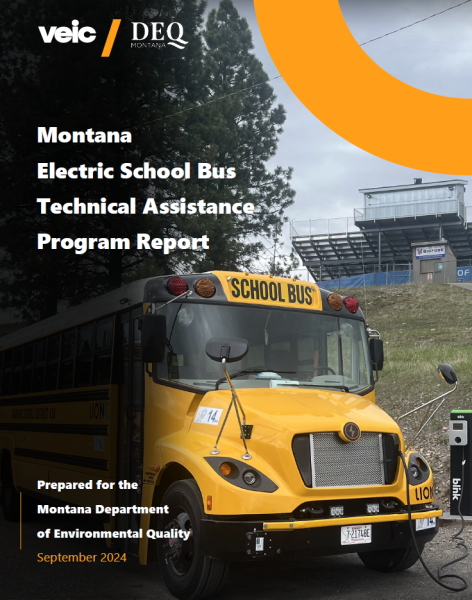This report was prepared for the Montana Department of Environmental Quality (DEQ) in September 2024 to evaluate the deployment of 17 electric school buses (ESB) in six Montana school districts: Bigfork, Billings, Clinton, East Helena, Fairfield, and Havre. Over the course of the project, VEIC provided each district with technical assistance and deployment support, including route analysis, warranty summaries, technical performance summaries, expected energy cost savings analysis, and technical assistance through electrical upgrades and charger installation.
In the report, you’ll find a detailed analysis of ESB reliability, performance, costs, and emissions, as well as qualitative feedback from bus drivers and other school district staff.
Top takeaways include:
- Performance: ESBs performed well in all weather conditions and route types. In extremely cold conditions, vehicle efficiency was reduced by up to 40%. However, ESBs were found to start up more consistently and reliably than diesel buses. ESBs were also found to have better acceleration and quieter operation than diesel buses, but a lower top speed.
- Cost: Each ESB averaged $1,575 in annual fuel savings compared to diesel buses. Per-mile energy fuel costs for fleets with utility demand charges were 2x higher than fuel costs without demand fees.
- Reliability: ESBs in the study were available for service 82% of the time compared to 94% for diesel buses. However, 72% of out-of-service days for ESBs occurred in a single district. Omitting that fleet, the remaining vehicles had an availability rate of 93%. The primary causes of vehicle downtime were related to components outside of the electric drivetrain. Resolving these issues was more challenging with some vendors than others.
- Emissions: ESBs significantly reduced emissions of greenhouse gases and criteria pollutants compared to diesel buses, despite emissions from electricity generation and the use of auxiliary diesel heaters in winter months.
The report also provides insights and best practices for future ESB deployments, including the importance of robust training, change management, optimizing regenerative braking, and implementing managed charging strategies to reduce costs.




